The Lauric Acid Market is estimated to be valued at USD 240.8 million in 2025 and is projected to reach USD 846.7 million by 2035, registering a compound annual growth rate (CAGR) of 13.4% over the forecast period.
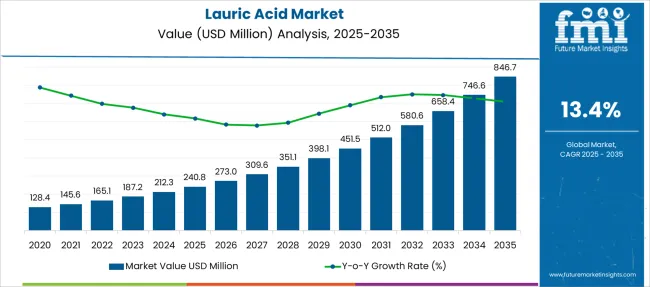
| Metric | Value |
|---|---|
| Lauric Acid Market Estimated Value in (2025 E) | USD 240.8 million |
| Lauric Acid Market Forecast Value in (2035 F) | USD 846.7 million |
| Forecast CAGR (2025 to 2035) | 13.4% |
The lauric acid market is experiencing steady expansion, fueled by rising interest in bio-based chemical alternatives and sustainable production methods derived from coconut and palm kernel oils. This trend has been reinforced by evolving environmental regulations and increasing consumer preference for plant-based ingredients in personal care, food processing, and industrial formulations. As manufacturers seek to reduce reliance on petroleum-based surfactants and chemical feedstocks, lauric acid is being increasingly integrated into biodegradable emulsifiers, specialty polymers, and antimicrobial coatings.
Technological advancements in fractionation and purification methods have enhanced the ability to tailor lauric acid purity to specific end-use requirements. The market outlook remains optimistic as strategic investments continue across oleochemical production facilities and downstream application segments such as plastics, cosmetics, and food additives.
In addition, growing R&D initiatives focusing on circular chemistry and traceable sourcing are expected to boost global adoption With regulatory frameworks emphasizing low environmental impact and renewable resource utilization, lauric acid is poised to gain traction as a critical intermediate in the green chemistry landscape.
The market is segmented by Purity, Application, and End-use and region. By Purity, the market is divided into Low Purity - <70%, Medium Purity - 70-85%, High Purity - 85-98%, and Ultra High Purity - 98-99%. In terms of Application, the market is classified into Emulsifier, Additive, Chemical Intermediate, Lubricant, and Surfactant. Based on End-use, the market is segmented into Plastics & Polymers, Food & Beverage, Textiles, Cosmetics & Personal Care, Soaps & Detergents, and Pharmaceuticals. Regionally, the market is classified into North America, Latin America, Western Europe, Eastern Europe, Balkan & Baltic Countries, Russia & Belarus, Central Asia, East Asia, South Asia & Pacific, and the Middle East & Africa.
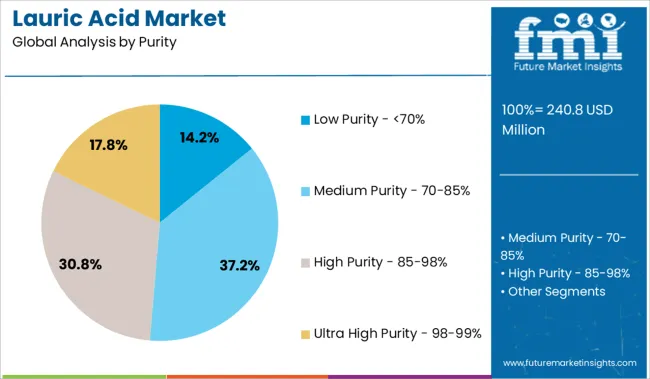
The low purity segment containing less than 70% lauric acid is expected to hold 14.2% of the market’s total revenue share in 2025. This segment’s growth is being driven by its broad applicability in cost-sensitive industrial processes, particularly where ultra-high purity is not a performance prerequisite. Low purity lauric acid is commonly utilized in sectors such as rubber additives, lubricants, and low-grade detergents, where functional efficacy is prioritized over compositional precision.
The segment's economic viability has made it attractive to manufacturers operating in developing economies where affordability governs procurement decisions. Additionally, increased availability of byproducts from palm and coconut oil refining processes has supported the large-scale production of this grade.
Minimal refinement requirements and higher production yields have contributed to its commercial success Furthermore, low purity variants are being adopted in formulations where lauric acid serves as a secondary ingredient, allowing flexibility in input material sourcing while maintaining competitive cost structures.
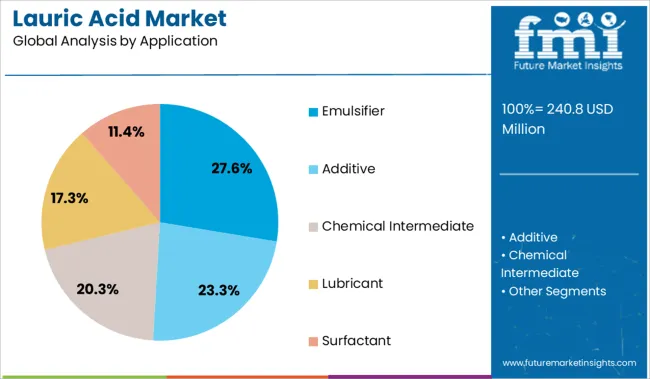
The emulsifier application segment is anticipated to account for 27.6% of the overall revenue share in the lauric acid market in 2025. This segment has gained momentum due to increasing utilization of lauric acid in stabilizing oil and water mixtures in both food-grade and industrial emulsions. Its performance in maintaining texture, consistency, and shelf-life in processed food, cosmetics, and pharmaceutical formulations has reinforced demand across global manufacturing facilities.
The versatility of lauric acid as a non-toxic and biodegradable emulsifier has aligned with growing consumer and regulatory pressure for cleaner label ingredients and environmentally friendly formulations. Formulators in food and personal care sectors are leveraging lauric acid’s emulsifying strength to reduce synthetic additive content without compromising performance.
The compatibility of lauric acid with other natural co-emulsifiers and active compounds has further supported its integration into multifunctional product matrices Additionally, the ability to program texture and viscosity through concentration adjustments has increased its adoption in advanced formulation design across both artisanal and industrial manufacturing settings.
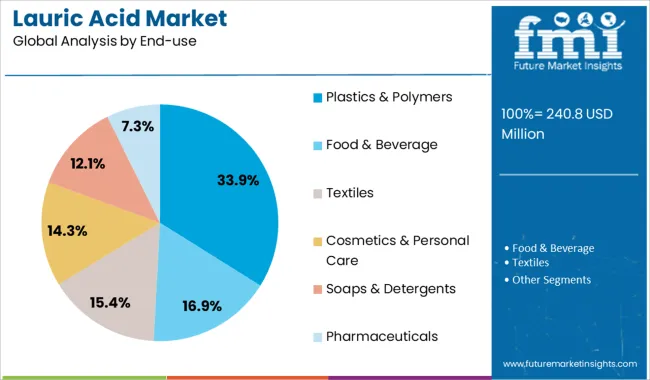
The plastics and polymers segment is projected to represent 33.9% of the total revenue share in the lauric acid market by 2025, establishing itself as the leading end-use category. This growth is being supported by increasing demand for lauric acid as a processing aid, plasticizer, and functional additive in polymer manufacturing. Its chemical structure enables interaction with a wide range of polymer matrices, thereby enhancing flexibility, thermal stability, and resistance to microbial degradation.
Lauric acid has found strategic applications in biodegradable plastics, where its natural origin and renewability contribute to eco-friendly material development. The drive toward reducing carbon footprint and transitioning to circular material systems has encouraged the substitution of traditional plastic additives with fatty acid derivatives.
Additionally, its use in stabilizing resin blends and improving extrusion processability has made it valuable in automotive components, flexible packaging, and construction materials Manufacturers have also favored lauric acid due to its compatibility with existing equipment and regulatory approval in major manufacturing economies, ensuring smooth integration without additional compliance overheads.
Increasing concerns regarding body odor are set to propel the usage of fragranced bathroom products worldwide. The emergence of unique bath bombs, bath salts, and body washes infused with floral scents and essential oils is expected to drive the popularity of spas. Apart from that, the high demand for intimate hygiene products is another factor that is set to foster the global lauric acid market growth in the upcoming years.
Moreover, high demand for aesthetically appealing bath and body products backed by rising disposable income and improving living standards is expected to fuel the market.
In July 2024, for instance, Wipro Consumer Care and Lighting introduced a new range of shower gels across its wide range of brands to cater to major consumer needs. It has launched body washes under its brands, including Yardley, Aramusk, Hygienix, and Santoor. Similar other product launches are projected to augur well for the global market.
Face cleansers, body washes, shampoos, and soaps infused with harmful chemicals claiming to have the desired effects are provided by many small-scale companies at relatively low cost, especially in underdeveloped countries. Such products can lead to adverse effects on hair growth, as well as skin and scalp health.
Apart from that, the increasing popularity of several home remedies, such as the usage of Indian soapberry, curd, Indian gooseberry, and egg yolk for hair cleansing may decline sales of commercial skin and hair care products. Spurred by the aforementioned factors, the global lauric acid market size may get hampered in the evaluation period.
The rising number of beauty-conscious consumers, especially in South Korea, China, Thailand, and Japan is likely to help the Asia Pacific to generate the largest lauric acid market share in future years. The high demand for shampoos infused with organic ingredients to keep the moisture balance of hair is a major factor that is projected to push the need for lauric acid across the Asia Pacific.
The presence of various small- and large-scale hair care product manufacturers in India, Thailand, Indonesia, and China is another vital factor that would foster the market.
In June 2025, for instance, Varesse, a leading Indonesian beauty care brand introduced its latest Serum Shampoo 2-in-1 Conditioner. The product will function as a treatment, conditioner, and shampoo simultaneously. The entry of several start-up companies in the Asia Pacific would also aid growth.
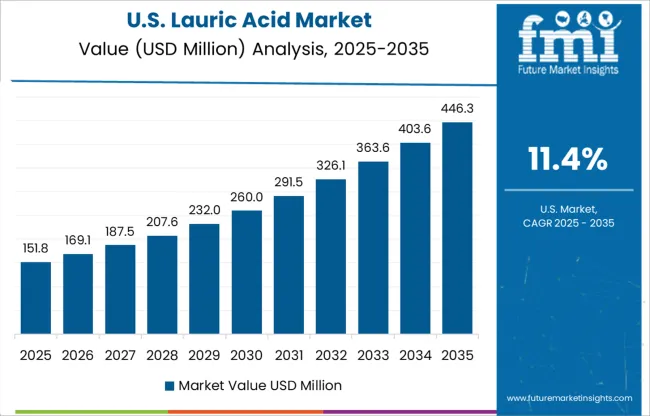
North America is expected to remain in the second position with the rising demand for soaps and detergents across the USA and Canada. Increasing awareness among consumers regarding hygiene and surging penetration of automatic washing machines across North America are estimated to push sales of laundry detergents, thereby spurring the demand for lauric acid.
In June 2025, for instance, COSMOS & HARMONY, a personal care and toiletry essential brand based in Thailand, announced its plans to enter the USA market by introducing its premium natural personal care products. Thus, the entry of numerous renowned soap and detergent brands in the USA and Canada is expected to bolster the North American market.
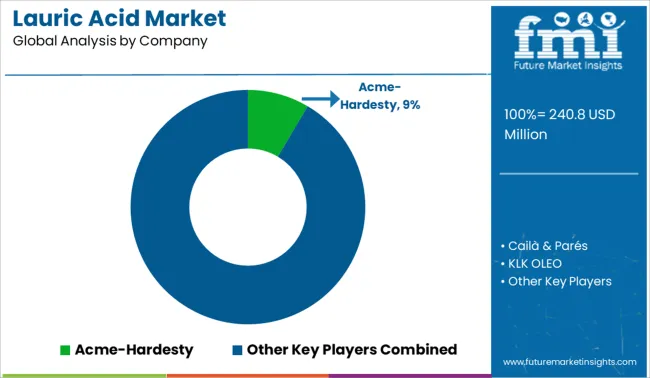
Some of the renowned companies present in the global lauric acid market include Kao Corporation, Bakrie Group, KLK OLEO, Permata Hijau, Acme-Hardesty, Emery Oleochemicals, IOI Oleo GmbH, Godrej Industries, AAK AB, Cailà & Parés, PT. Cisadane Raya, Wilmar International Ltd., VVF LLC, Musim Mas Holdings Pte. Ltd., Timur OleoChemicals, Oleon, and Pacific Oleochemicals among others.
The global market is highly competitive with the presence of a large number of international and domestic players. They are mainly striving to expand their portfolios by introducing cutting-edge products in the market through exhaustive research and development activities. A few other key players are aiming to engage in mergers and acquisitions, contracts, and joint ventures to expand their distribution networks and compete in the market.
| Report Attribute | Details |
|---|---|
| Growth Rate | CAGR of 13.4% from 2025 to 2035 |
| Base Year for Estimation | 2024 |
| Historical Data | 2020 to 2024 |
| Forecast Period | 2025 to 2035 |
| Quantitative Units | Revenue in USD Million, Volume in Kilotons, and CAGR from 2025 to 2035 |
| Report Coverage | Revenue Forecast, Volume Forecast, Company Ranking, Competitive Landscape, Growth Factors, Trends, and Pricing Analysis |
| Segments Covered |
Purity, Application, End Use, Region |
| Regions Covered |
North America; Latin America; Western Europe; Eastern Europe; Asia Pacific Excluding Japan; Japan; Middle East and Africa |
| Key Countries Profiled | USA, Canada, Brazil, Argentina, Germany, United Kingdom, France, Spain, Italy, Nordics, BENELUX, Australia & New Zealand, China, India, ASIAN, GCC Countries, South Africa |
| Key Companies Profiled |
Kao Corporation; Bakrie Group; KLK OLEO; Permata Hijau; Acme-Hardesty; Emery Oleochemicals; IOI Oleo GmbH; Godrej Industries; AAK AB; Cailà & Parés; PT. Cisadane Raya; Wilmar International Ltd.; VVF LLC; Musim Mas Holdings Pte. Ltd.; Timur OleoChemicals; Oleon; Pacific Oleochemicals |
| Customization | Available Upon Request |
The global lauric acid market is estimated to be valued at USD 240.8 million in 2025.
The market size for the lauric acid market is projected to reach USD 846.7 million by 2035.
The lauric acid market is expected to grow at a 13.4% CAGR between 2025 and 2035.
The key product types in lauric acid market are low purity - <70%, medium purity - 70-85%, high purity - 85-98% and ultra high purity - 98-99%.
In terms of application, emulsifier segment to command 27.6% share in the lauric acid market in 2025.






Full Research Suite comprises of:
Market outlook & trends analysis
Interviews & case studies
Strategic recommendations
Vendor profiles & capabilities analysis
5-year forecasts
8 regions and 60+ country-level data splits
Market segment data splits
12 months of continuous data updates
DELIVERED AS:
PDF EXCEL ONLINE
Lauric Aldehyde Market Growth - Trends & Forecast 2025 to 2035
Acid Resistant Pipe Market Forecast and Outlook 2025 to 2035
Acid Coil Cleaner Market Size and Share Forecast Outlook 2025 to 2035
Acid Filling and Leveling Machine Market Size and Share Forecast Outlook 2025 to 2035
Acid Chlorides Market Size and Share Forecast Outlook 2025 to 2035
Acid-Sensitive APIs Market Analysis - Size, Share, and Forecast Outlook 2025 to 2035
Acidified Whey Protein Market Analysis - Size, Share & Trends 2025 to 2035
Acid Dyes Market Growth - Trends & Forecast 2025 to 2035
Acidity Regulator Market Growth - Trends & Forecast 2025 to 2035
Acid Proof Lining Market Trends 2025 to 2035
Acid Citrate Dextrose Tube Market Trends – Growth & Industry Outlook 2024-2034
Acid Orange Market
Antacids Market Analysis – Size, Trends & Forecast 2025 to 2035
Lead Acid Battery Market Size and Share Forecast Outlook 2025 to 2035
Lead Acid Battery Recycling Market Size and Share Forecast Outlook 2025 to 2035
Feed Acidifier Market Analysis Size Share and Forecast Outlook 2025 to 2035
Food Acidulants Market Growth - Key Trends, Size & Forecast 2024 to 2034
Boric Acid Market Forecast and Outlook 2025 to 2035
Folic Acid Market Size and Share Forecast Outlook 2025 to 2035
Oleic Acid Market Size and Share Forecast Outlook 2025 to 2035

Thank you!
You will receive an email from our Business Development Manager. Please be sure to check your SPAM/JUNK folder too.
Chat With
MaRIA